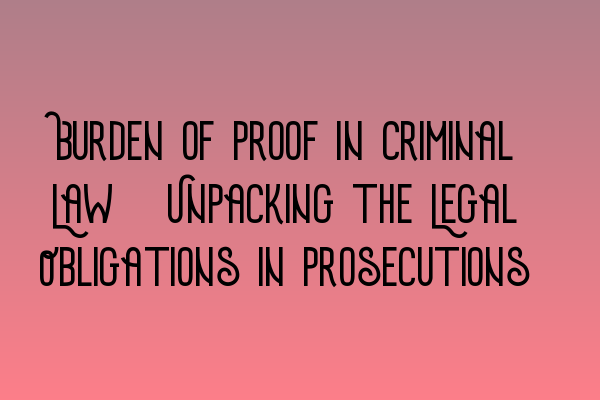Burden of Proof in Criminal Law: Unpacking the Legal Obligations in Prosecutions
Welcome to SQE Criminal Law & Practice Law UK! In this blog post, we will delve into an important aspect of criminal law: the burden of proof. Understanding the burden of proof is crucial for both solicitors and legal professionals, as it determines the level of evidence required to secure a conviction or acquittal in a criminal trial.
What is the Burden of Proof?
The burden of proof refers to the obligation placed on the prosecution in a criminal case to prove the guilt of the accused beyond a reasonable doubt. It is an essential aspect of the criminal justice system, ensuring that no one is wrongfully convicted or subjected to unfair trials.
As a solicitor or legal professional, it is crucial to grasp the significance of the burden of proof in criminal cases. Not only does it govern the legal process, but it also influences the strategies and approaches taken by both the prosecution and defense.
Standard of Proof: Beyond a Reasonable Doubt
The standard of proof in criminal law is higher than that in civil cases. In criminal cases, the burden of proof rests on the prosecution, and they must demonstrate the defendant’s guilt beyond a reasonable doubt. This means that there should be no other logical explanation based on the evidence presented that would lead to a different conclusion.
The concept of “beyond a reasonable doubt” is essential to ensure that innocent individuals are not wrongfully convicted. It places the onus on the prosecution to present compelling evidence that leaves no room for doubt or alternative interpretations.
In courts, the burden of proof is on the prosecution right from the beginning of the trial till the end. Throughout the proceedings, the prosecution must provide convincing evidence that supports each element of the offense charged. Simply put, it is not enough for the prosecution to show that the defendant is likely guilty; they must establish guilt beyond a reasonable doubt.
Shifting the Burden of Proof
While the burden of proof primarily lies with the prosecution, there are instances where the burden shifts to the defense. For example, in cases where the defendant raises a defense, such as self-defense, the burden to establish that defense shifts to the defendant.
This shifting of the burden emphasizes the importance of the defense’s ability to present evidence and arguments to counter the prosecution’s case. The defense must provide reasonable doubt to defeat the prosecution’s assertion of guilt.
The Role of Solicitors in Establishing the Burden of Proof
As a solicitor, you play a vital role in establishing and challenging the burden of proof in criminal cases. Your expertise and knowledge of criminal law and evidentiary rules are crucial for ensuring that your client’s rights are protected and that the burden of proof is properly discharged.
In the pursuit of justice, solicitors gather evidence, interview witnesses, analyze case law, and build compelling arguments to either prove or disprove guilt. Through careful examination of the evidence and effective cross-examination, solicitors challenge the prosecution’s case, identify weaknesses, and create doubt in the minds of the jurors.
To succeed in criminal cases, solicitors must stay updated with the latest legal developments and possess a deep understanding of the burden of proof and its implications. This knowledge allows them to navigate the complexities of criminal law and present a strong defense for their clients.
Conclusion
The burden of proof in criminal law is a fundamental principle that safeguards the rights of individuals accused of committing crimes. Understanding the burden of proof is essential for solicitors and legal professionals, as it influences trial strategies, evidentiary requirements, and the overall pursuit of justice.
At SQE Criminal Law & Practice Law UK, we are dedicated to providing comprehensive resources and insights to help solicitors excel in their practice. If you’re interested in demystifying the Solicitors Qualifying Examination format, learning about LLC formation, understanding UK business regulations, or preparing for the SQE exam, be sure to check out our related articles:
Thank you for reading our blog post on the burden of proof in criminal law. We hope you found it informative and valuable. If you have any questions or need further assistance, please feel free to contact us. Stay tuned for more insightful content from SQE Criminal Law & Practice Law UK!
